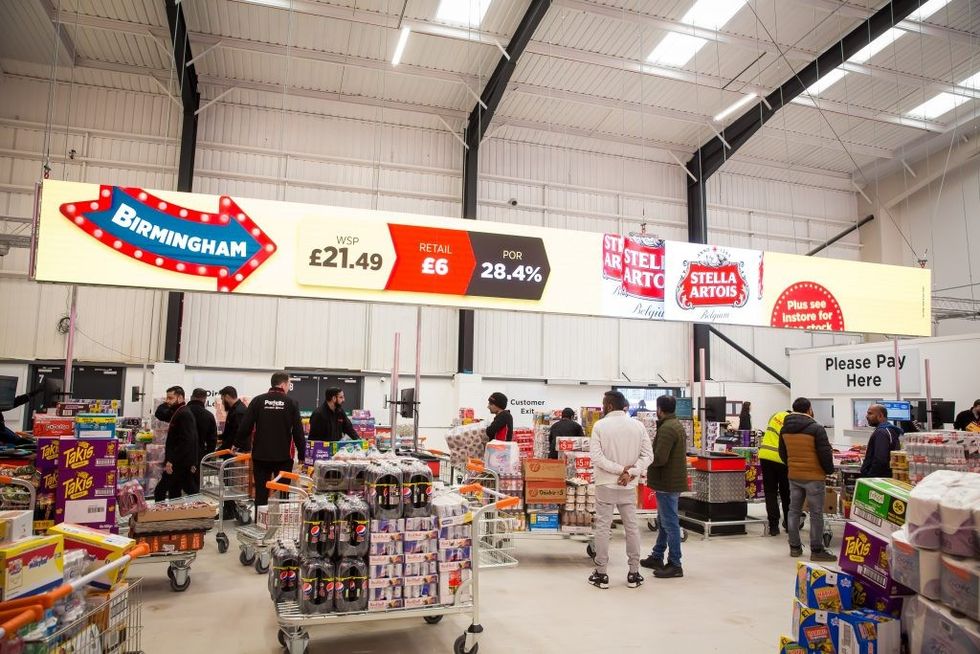It would not be an exaggeration to say that the grocery market – both wholesale and retail – is the lifeline of any nation.
The sheer numbers give a glimpse of this mammoth sector. In 2021, the size of the UK grocery market stood at around £212 billion. The market has been steadily growing since 2004 and is estimated to reach over £241 billion by 2027.
The market size of grocery wholesaling in particular, measured by revenue was estimated at £37.9bn in 2022, states IBIS World. Prominent names in UK’s grocery wholesaling are Booker, Bestway, Parfetts, Dhamecha, Cotswold Fayre, Hancocks and JW Filshill.
Booker, now acquired by Tesco, serves over 400,000 customers across a number of businesses, offering both
delivery and through over 173 cash and carry depots.
Bestway comes next in line, serving 130,000 independent retailers from 64 warehouses nationwide. North-west based wholesaler Parfetts is also renowned amongst retailers. It has eight depots covering the East and West Midlands, Yorkshire, Derbyshire, the Northeast and Northwest, offering a range of over 9,000 products. And then there is of course SPAR.
SPAR comprises five Regional Distribution Centres (RDCs) and one Central Office working together with independent retailers. Dhamecha has a core of nine depots around London and the Midlands-Wembley, Barking, Enfield, Croydon, Watford, Hayes, Lewisham, Leicester and Birmingham depots.
Other prominent names in this world are JW Filshill and Hancocks. The latter has 20 cash and carries nationwide and an online wholesale sweets shop serving the country. Not to forget Cotswold Fayre that sells and distributes a large range of speciality food and drink to convenience stores among other businesses in the UK and Ireland. Also, Costco, which is both a retailer to individuals and a wholesaler to businesses with 28 cash-and-carry locations across the UK, although it has not gained US-like popularity here.
What’s happening?
One of the most-talked about big shifts over the last 10 years or so is towards delivered wholesale, which was further propelled during pandemic. As retailers shifted from depots to deliveries, their need to have huge stock filled in the back room has started taking a back seat.
Epicurium Managing Director Ben Mckechnie believes that there is a growing demand to be able to order “straight to shelf” without having to fill up stock rooms with extra stock, and to be able to order one day and have it delivered the next.
Pandemic has brought another change in this sector and that is making people wake up to the importance of “convenience” once again.
“The big change driven by the pandemic is the importance of convenience. With the hybrid working model now well established, people are buying more locally in towns and suburbs rather than coffee shops and commuter sites like they would be if they are in the office, and wholesale has had to adapt to this,” Mckechnie tells Asian Trader.
Cost-of-living crisis is on everyone’s mind. Consumers are constantly altering buying habits, looking for products that offer the most value for money. Slowdown or not, there are few things that shoppers still buy as much of, and confectionery tops this list.
Kathryn Hague, Head of Marketing at Hancocks, says that cost-of-living crisis has had a big impact on consumer habits, resulting in a “lipstick effect”. It means that affordable luxuries are on the rise, as other, pricier product sales struggle. Many households see confectionery as an affordable way to treat themselves, so wholesalers and retailers should make sure to be stocked up on impulse purchasing, snacking products and sharing bags.
“With inflation forcing households to cut back on costs, wholesalers should consider enhancing their value offerings in stores. Price-marked packs that offer great size and value for money, like our £1.25 Bonds Share Bags and £0.50 Kids Sweet Bags, are a popular choice among retailers.
“We’ve also seen an increased interest in sustainable products, as more than half of the shoppers avoid buying products that have non-recyclable packaging. The Bonds Candy Cups are a popular sustainable choice, as they’re made from 30 per cent recyclable material and are curbside recyclable.
“Consumers are also looking for healthier sweets. Low-calorie products have grown by 3 per cent in the last year, to 55 per cent and one in four adults avoid products with artificial sweeteners,” Hague told Asian Trader.
Despite the challenges every wholesaler has experienced over the past 12 months, SPAR is able to deliver profit for its retailers and value for its customers.
Ian Taylor, SPAR UK Retail Director, reveals the secret behind this success.
“We have attracted new customers to visit more and spend more in our stores by building an emotional connection with convenience shoppers, and developed our new brand positioning, called the ‘Joy of Living Locally’,” says Taylor.
The cost-of-living crisis might be a major setback for every aspect of the grocery business but there is one thing
that has emerged as a knight-in-shining armor for everyone, and that is the own-label range. It’s cheaper for customers, offers better margin for retailers and is helping wholesalers in gaining a set of loyal
retailers as well as in creating unique brand positioning.
Taylor from SPAR explains how they are focusing on their own label range.
“We are making SPAR own label the first choice in convenience by growing SPAR own label sales and penetration. We have agreed targets by category and RDC and have developed our sourcing model to ensure long-term sustainable supply.
“We have 900 SPAR own label products. To increase distribution, especially across ‘hidden gems’ in the range, we developed a customer focused initiative called ‘Spotlight’ to generate sales growth.
“We have launched new products relevant for our customers, benchmarked for quality, taste and price,” Taylor
tells Asian Trader, adding that SPAR is the first grocer in the UK to offer a range of “vegan-friendly own label wine”.
SPAR is also “geared up to offer local ranges” better than its nearest competitor. It is working with International
SPAR to bring overseas its own label products to the UK.
Steve Moore, head of retail at Parfetts, agrees here when he says that own label is a “key factor in providing a value proposition that delivers the retailer a healthy profit on return”.
What works?
Hancocks banks on having open communication with retailers to maximise sales, as “we rely on retailers to place repeat orders”. The confectionery wholesaler also makes sure its range of products are displayed and packaged well to appeal to retailers visually.
“Clear and attractive POS will turn heads and can translate into sales for the product,” Hague tells Asian Trader.
Keeping one’s target customer is the key here- for both retailers as well as wholesalers. Clearly, stocking a wide range of what works best in the c-store is crucial for both these parties like snacks and confectionery products.
Hague agrees when she says that finding a quick fix for their cravings is one of the top reasons of a visit to c-store, implying a large portion of their revenue comes from impulse purchases.
In the current environment, while shoppers are looking for offers and discounts, retailers are hunting for better margins.
“With the current cost of living crisis, people are trying to save money and will be on the lookout for any offers available. Showcasing good value offers clearly will allow independents to attract customers, especially as their prices tend to be more affordable than big multiples,” says Hague.
Offering new and innovative products also works like magic, so much so that sometimes offering trendy new line of products acts like footfall magnet. Like for instance the PRIME energy drink which has recently created quite a stir- retailers are seen posting on social media to flaunt that they have the exclusive range of this particular new drink.
Echoing the similar thought, Moore from Parfetts reveals how there is a big demand for products such as Prime and American candy, and Takis.

Additionally, he advices to stock up well on water and soft drinks. He says that all categories are important in delivering a compelling retail offer though some key areas do over an index, such as tobacco, soft drinks and confectionery, which are still the big sellers in convenience.
“Vaping is also a high-growth, high-margin category, so it’s really important to have the latest in-demand products available,” Moore points out.
“The demand for seasonal products, especially impulse buys such as ice creams, can fluctuate quickly, and retailers can get caught out if we have a sustained spell of hot weather - when it’s also worth stocking up on water and soft drinks,” Moore tells Asian Trader.
Tom Fender, Development Director of TWC, counts offering new and innovative line of products to retailers as one of the key customer services that wholesalers can give to keep retailers returning to them for more.
Hague from Hancocks seems to agree here.
“At Hancocks we’re frequently releasing new products to give the retailers an opportunity to offer their customers the best selection of confectionery products.
“We’ve introduced some NPD products to our popular Vimto range. Retailers looking to stock up on healthier treats will love the Vimto Zero Lollies RRP £0.20 per unit. These lollies are sugar-free, packed with vitamin C and made with real fruit juice.
“The popular pick n mix brand Kingsway has launched a new Mega Value range with six popular value-for-money products, including Kingsway Value Peach Rings, Kingsway Value Sour Bears, Kingsway Value Sour Dummies, Kingsway Value Jelly Blue Babies, Kingsway Value Fizzy Cola Bottles and Kingsway Value Fizzy Cherry Cola Bottles.”
Another such interesting product launch to take note here is MoguMogu, the drink "You Gotta Chew" which is set to launch in W H Smith’s stores across the UK in May 2023, after experiencing exponential growth over the past 18 months.
"We are thrilled to bring MoguMogu to W H Smith’s stores across the UK," Sunny Chadha from ASCO Foods Ltd, MoguMogu’s UK&I exclusive distributor, told Asian Trader.
"Our growth in the first quarter of 2023 has been phenomenal, and we believe this expansion will only increase our reach and appeal among consumers. We look forward to providing even more people with the opportunity to try this delicious and unique drink."
MoguMogu has already established itself as a firm favourite among consumers, with 10 million bottles already sold in Q1 2023, almost matching in 3 months the 11 million bottles sold in 2022.
Arming-up with data
Offering information and making retailers aware of trends are further value-addition that wholesalers can offer to their buyers.
McKenzie from Epicurium vouches on such services, specifically “around regulations such as HFSS”.
“Epicurium is in growth as we are focused on healthier snacks, which is a fast-growing category. With issues such as cost-of-living, we are seeing growth in premium and trend-based lifestyle brands, and this is only going to continue,” he says.
McKenzie believes that if armed with correct information about what’s trending, independents can differentiate themselves and gain competitive advantage.
“Multiples are essentially a big corporate brand. However, an independent retailer can tap into the local need and into the local community. They can provide differentiating products to help do that and help with advisory information.
“It is about getting the more localised offer and advice, so that they can differentiate themselves against the supermarkets in order to gain a competitive advantage, rather than having to compete on price. Essentially, they can get an advantage by having a more suitable product range for the local area and by understanding what they need to supply,” McKenzie says.

Epicurium is running a number of margin-boosting promotions for retailers throughout May, as well as in the following months.
It is essential to keep a close tab on what works in convenience. McKenzie feels that impulse and specific occasions such as ‘big night in’, something to eat now, and food to go, will tend to perform the strongest.
“Those kinds of products that are going to serve those occasions are going to do well for when consumers are looking for something to have when they watch sport or when their friends are coming round, for example. For this, it is quick and easy to go to a local independent store, notably for the big night in and food to go impulses.
“Sharing packs also work well when guests are coming round, as do smaller multipacks. A ‘top up shop’ also provides opportunities, such as when a consumer needs a single onion or a pint of milk, so it is important to have a range that will serve that purpose.”
McKenzie advices wholesalers to keep the complete range, rather than just one or two line of products.
“Also, it is important to ensure there is a complete range that covers the key bases within each category, rather than just testing on or two products, as if you are going to go for a category you need a good range that retailers will find useful and serve their purpose. Ultimately, if they can’t find a complete range they will go elsewhere,” he says.
Offering guidance and info can create a whole lot of difference in buying experience and overall trust.
Taylor from SPAR reveals how they have been focused on in-store category management and have even created HFSS model store layouts as well as a programme of store format developments.
“We developed a portfolio of mission-based store formats and flagship stores for the key formats of ‘On the Go’ and ‘For Now For Later’ to showcase best practice.
“We created a customer centric range for stores that is defined by format and by category. Every SPAR store has been modeled by location, customer type, competition and sales by mission. Planograms are matched to the format with local influence,” Taylor tells Asian Trader.
SPAR’s Business Development Managers provide retailers with dedicated support and a central point of contact, helping retailers grow their business and improve profitability.
In an industry cluttered with offers, discounts and schemes, genuine advice and guidance is something that can make retailers loyal to a particular wholesaler. In the words of Fender from TWC, it is the “customer service and not special discounts that takes wholesalers a step ahead”.
Moore from Parfetts, reveals that the wholesaler has a team of retail development advisors who are “on hand to support our symbol partners and cash and carry customers”.
“At Parfetts, we utilise the Unitas plan for profit category plans. We also consider local products to ensure the right mix is on offer for that store's consumers. In addition, our RDAs carry out regular store health checks focusing on the right range, price and promotions.
Most recently and as a first for the industry, Bestway Wholesale, has launched a real-time analytics dashboard for suppliers, enabling them to monitor their brand’s performance and give deeper insights into Bestway’s customers’ journey.
Not only is it a first in the industry but it’s a huge step forward for the industry as suppliers cannot directly access this level of data from any other wholesaler in the sector. Suppliers would previously have relied on the wholesaler sharing select data with them and not the deep data that shows the customer journey.
World of alcohol
Drinks wholesale is big business in the UK, growing, year on year, at a rate of 1.8 per cent since 2018. The biggest alcohol brands are already present in big supermarkets and here is where wholesalers can support independent retailers to gain an edge by offering wide ranges of independent and sometime local brands.
Nick Gillett, co-founder and Managing Director of spirits distributor Mangrove Global, as well as an industry expert and commentator, advices wholesalers to provide “trust and honest guidance backed up by data”.
“When it comes to selling to retailers, the relationship has a huge part to play in wholesale success,” says Gillett.
“If wholesalers can do this and offer a good mix of brands, small and large, value and premium, from quality producers across the globe –they’ll be a winner. And they’ll stop shelves from becoming dull, boring places filled with the same big brand bottles.”
So what’s working in this aisle?
According to Gillett, there is a huge growth in World Whisky and Tequila – with some exceptional twists and flavor exploration being undertaken by independents.
“Wholesalers can introduce retailers to categories and products they might be less familiar with, letting stores of all sizes stock a range in an efficient way.”
Customers are buying more ingredients, including mixers and liqueurs which need to be well stocked, as well as value spirits for mixing, and premium spirits for neater drinks.
“And this is all good news for challenger brands and the retailers that stock them as many are at a premium price point with greater margin opportunities than the mainstream brands.”

Highlighting product range by catching buyers’ attention is also crucial here.
“From a visual perspective, gift packaging, special editions, shelf displays, floor displays, and prize initiatives can highlight key products at key times. That’s what you’ll find us doing over the coming months to support our brands.
“And what’s more, when you work with independents like we do, you’ll find that these companies are running their own education and customer engagement campaigns – giving wholesalers plenty to work with.
"Disruption and diversity are routes to success. If wholesalers can bring brands such as these into their own offering, they’ll not only see success, but the shop shelf will be an altogether more exciting place to be,” says Gillett.
Changing Dynamics
The traditional demarcation lines between manufacturers, wholesalers and retailers are seemingly merging and we are entering a new era of consolidations and mega-mergers.
Tesco’s merger with Booker was one of the biggest shake-ups in the wholesale and convenience sector in recent years. While the merger of Sainsbury’s and Asda could not happen, Bestway’s recent swoop on Sainsbury’s has fueled speculation of another takeover.
Moreover, while pandemic propelled the delivered model with many wholesalers switching to delivery options, industry leaders feel the equation will shift back in 12-18 months.
Lindsey Cambrige from FWD reveals how delivered model is turning out to be less cost-effective.
“Wholesalers will soon be attracting retailers back to cash-and-carry depots. The fuel cost has gone to the roof and the delievered-model is turning out to be less cost-effective with each passing month,” Cambrige told Asian Trader.
Own-label range will continue to rule, said Cambrige.
“Retailers are looking at stocking own-lable range- both due to better margins and spike in demand from shoppers looking for cheaper alternatives. Wholesalers are trying to expand this range to retain more retailers by catering most of their needs.”
Grocery wholesalers have endured challenging operating conditions over the past five years. Pricing competition from supermarkets has led to these retail giants using their market dominance to negotiate better prices, constraining revenue and narrowing profit margins.
Jamie Ferguson, head of marketing at Parfetts, feels that the industry is facing sustained challenges around availability and rising, constantly changing prices.
Despite its colossal size, scale and operation, the wholesale sector has proven surprisingly resilient and adaptable to changing times – be it technological evolution, the pandemic, or most recently, cost-of-living-crisis.
While some experts feel that retailers will once again return to depots for their supplies, some state that delivery will rise and go green. The future path may seem blurred, but it is definitely not bleak.







